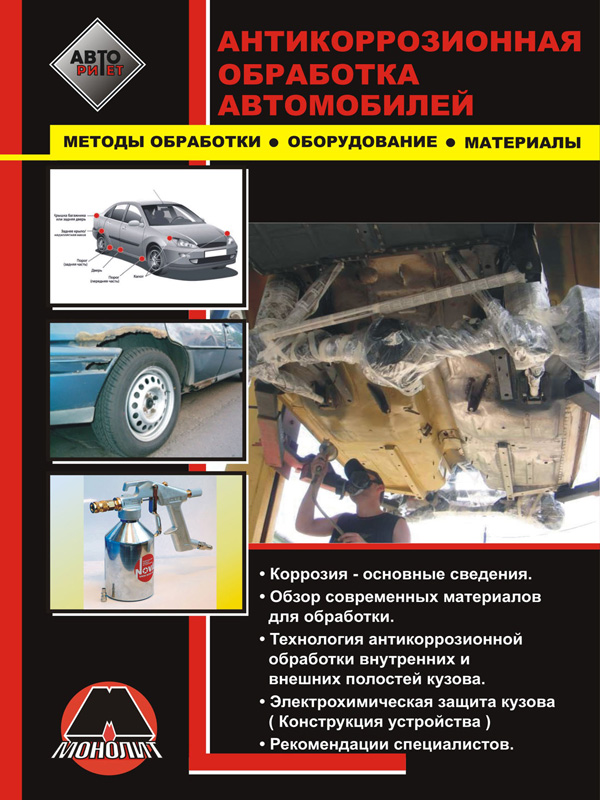 Atmospheric Corrosion
Atmospheric Corrosion
Автор: Christofer Leygraf
Год издания: 0000
Presents a comprehensive look at atmospheric corrosion, combining expertise in corrosion science and atmospheric chemistry Is an invaluable resource for corrosion scientists, corrosion engineers, and anyone interested in the theory and application of Atmospheric Corrosion Updates and expands topics covered to include, international exposure programs and the environmental effects of atmospheric corrosion Covers basic principles and theory of atmospheric corrosion chemistry as well as corrosion mechanisms in controlled and uncontrolled environments Details degradation of materials in architectural and structural applications, electronic devices, and cultural artifacts Includes appendices with data on specific materials, experimental techniques, atmospheric species
 Anti-corrosion treatment of the car body, in eBook
Anti-corrosion treatment of the car body, in eBook
Автор: Монолит
Год издания:
Content
Introduction
Overview
When do rustproofing
The frequency and amount of processing
The equipment for processing
Chemicals for the treatment of
The main stages of the full anti-corrosion treatment
Application of anti-corrosion agents
Installing the wing flaps and mudguards
Where do anti-corrosion treatment
Independent anti-corrosion treatment
Device for electrochemical protection against corrosion of the car body
 Metal Corrosion. Electroplating (Защита от металлов от коррозии. Гальванотехника)
Metal Corrosion. Electroplating (Защита от металлов от коррозии. Гальванотехника)
Автор: Я. Ившин
Год издания:
Вопросы защиты металлов от коррозии рассмотрены в оригинальных текстах зарубежных авторов, предназначенных для занятий по курсам «Специализированный профессионально-ориентированный перевод (английский язык)» и «Английский язык (технический перевод)». Представлены практические задания как для аудиторной, так и для самостоятельной работы.
 Rubber as a Construction Material for Corrosion Protection. A Comprehensive Guide for Process Equipment Designers
Rubber as a Construction Material for Corrosion Protection. A Comprehensive Guide for Process Equipment Designers
Автор: V. Chandrasekaran C.
Год издания:
First book on rubber used as a construction material dedicated to the chemical process industry Despite the long history of rubber as a construction material, this book is a unique publication as it comprehensively looks at the material with respect to the anti-corrosion requirements of the multitude of industries where rubber is used, both on land and offshore. This guide documents how rubber reliably meets the threats of corrosion and contributes to the longevity of the equipment. Chapters on ebonite, natural, and synthetic rubbers, examine their relevant properties and chemical resistance. The book details the practical aspects and handling of rubber lined equipment: thin-walled structures, vacuum vessels, ducts, large diameter tanks, agitators, and fully lined pipes (both inside and outside). Molded and fabricated products of ebonite and soft rubber as well as hand-made rubber products are shown along with vulcanization technology, testing and inspections, measurements and standards. Several case studies are included demonstrating the preferential choice of rubber as a construction material as well as practical applications and techniques of its usage in the chlor-alkali, fertilizer, mineral processing and other core chemical processing industries, which are the largest consumers of rubber as a material of construction. The volume ends with a section on aging and prediction of service life. Rubber as a Construction Material for Corrosion Protection will be used by chemical engineers, rubber technologists, students, research workers worldwide in the rubber industry and process industries such as fertilizer, mining and ore, oil & gas, paper and pulp, steel plants, as well as people engaged in corrosion protection. The book will also be very useful to the construction industry.
 Green Corrosion Inhibitors. Theory and Practice
Green Corrosion Inhibitors. Theory and Practice
Автор: V. S. Sastri
Год издания:
A book to cover developments in corrosion inhibitors is long overdue. This has been addressed by Dr Sastri in a book which presents fundamental aspects of corrosion inhibition, historical developments and the industrial applications of inhibitors. The book deals with the electrochemical principles and chemical aspects of corrosion inhibition, such as stability of metal complexes, the Hammett equation, hard and soft acid and base principle, quantum chemical aspects and Hansch' s model and also with the various surface analysis techniques, e.g. XPS, Auger, SIMS and Raman spectroscopy, that are used in industry for corrosion inhibition. The applications of corrosion inhibition are wide ranging. Examples given in this book include: oil and gas wells, petrochemical plants, steel reinforced cement, water cooling systems, and many more. The final chapters discuss economic and environmental considerations which are now of prime importance. The book is written for researchers in academia and industry, practicing corrosion engineers and students of materials science, engineering and applied chemistry.
 Uhlig's Corrosion Handbook
Uhlig's Corrosion Handbook
Автор: R. Revie Winston
Год издания:
This book serves as a reference for engineers, scientists, and students concerned with the use of materials in applications where reliability and resistance to corrosion are important. It updates the coverage of its predecessor, including coverage of: corrosion rates of steel in major river systems and atmospheric corrosion rates, the corrosion behavior of materials such as weathering steels and newer stainless alloys, and the corrosion behavior and engineering approaches to corrosion control for nonmetallic materials. New chapters include: high-temperature oxidation of metals and alloys, nanomaterials, and dental materials, anodic protection. Also featured are chapters dealing with standards for corrosion testing, microbiological corrosion, and electrochemical noise.
 Metal Corrosion. Electroplating (Защита от металлов от коррозии. Гальванотехника)
Metal Corrosion. Electroplating (Защита от металлов от коррозии. Гальванотехника)
 Rubber as a Construction Material for Corrosion Protection. A Comprehensive Guide for Process Equipment Designers
Rubber as a Construction Material for Corrosion Protection. A Comprehensive Guide for Process Equipment Designers



